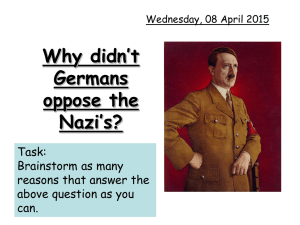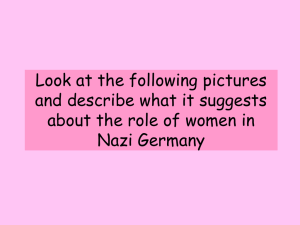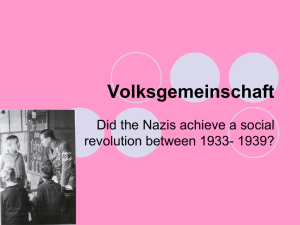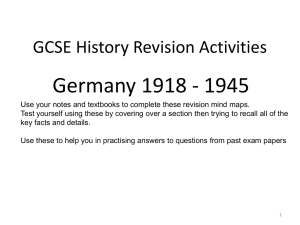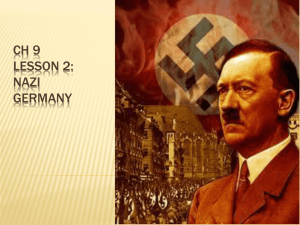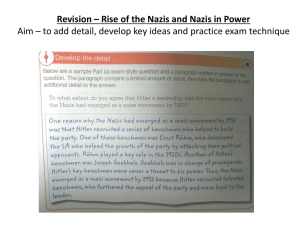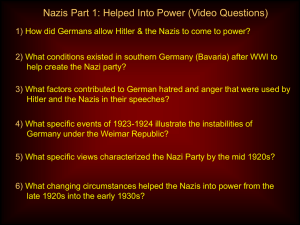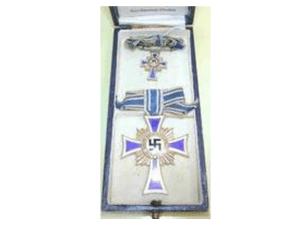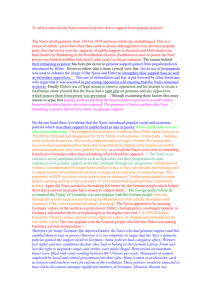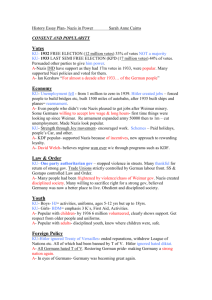Hitler Social Policies Hollie Matias
advertisement
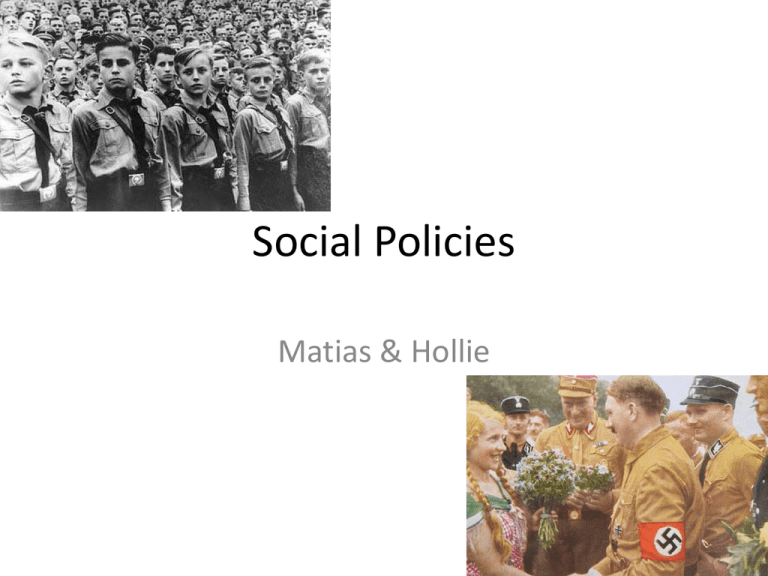
Social Policies Matias & Hollie Young people • The Nazis saw the young as important. They used them as tools. • They had to teach children to believe in the Aryan race. • If they wanted young men to fight for the ‘master race’, they had to teach them the military ideas of obedience, discipline and sacrifice. • Young Germans were taught to see the Fuhrer as a father figure – The Fuhrer demanded loyalty from his people Education • • • • • • Teachers were chosen and examined by the Nazis The teachers would attended classes during holidays to get a better idea of the Nazi curriculum 97% teachers joined the Nazi teachers’ association Children were told that if a teacher said something that went against Hitler or the Nazis, they were to tell the authorities The schools were provided with a curriculum that was provided by the Nazis History- Celebration of Germany victories and failures of the Weimar (betrayal 1918) – Biology- Study of the different races • – • • • Maths- Facts and figures on how to teach the disabled and how to look after them Indoctrination and propaganda was a common practice in schools Jews and communists were blamed for all disasters Jewish children were not allowed to attend school after 1935 – • • • "No boy or girl should leave school without complete knowledge of the necessity and meaning of blood purity." -Hitler The Nazis thought that the Jewish children would ‘contaminate’ the others Students had little knowledge of the Nazi ideas Not all the young men were brainwashed, some used the youth duties as an excuse to miss school The Nazi education system had no universal effect on the young Germans The Hitler Youth • • • Started in 1925 and by the end of 1933, people started joining voluntarily Hitler believed that the future for Nazi Germany was in the younger generation The youth provided fun activities for the young generation – • • • • The youth produced magazines; The Youth and homeland, The German Girl The Hitler Youth meant a chance to be able to join all kinds of fun organisations Girls were offered a chance to escape the female role of looking after the children and the home Many young Germans were not thinking of the Nazis when they joined the Hitler Youth...it was all about the chance to have fun – • “I was not thinking of the Fuhrer when i gave the Nazi salute, but of games, sports, hiking, singing, camping and other exciting activities” - Marianne Mackinnon Membership became compulsory in the 1930’s – • • • • • Weekend trips, walking and sports This caused the people to become uninterested and made them not care The discipline became more serious and stricter When the war started, all leisure activities were stopped Places where activities took place were bombed (football fields, club buildings) The Youth members were drafted to war Young members started to oppose to Hitler and created their own youth gangs Opposition to the Hitler Youth • Three main opposition gangs – Edelweiss pirates, Meuten and Swing Movement • • The Pirates would taunt and beat the Hitler Youth Patrols These types of incidents attracted un-wanted attention from the authorities – Barthel Schink, 16, was hung after having one warning • The Meuten were similar to the Pirates – They were made up of middle-class citizens – There were around 1,500 members across various different groups • • • • The Swing Movement was made up of the middle-class who rejected the German nationalist music and preferred to listen to jazz and swing music Live performances were banned and the authorities were appalled by the Swing Movements dances The White Rose- 1942, a university resistance group who were executed in 1943 after handing out anti-Nazi leaflets Juvenile crime increased from 16000 in 1933 to over 21000 in 1940 Women and Family Life • • • • • • • • • • • • • • • Nazis were anti-feminists The Nazi slogan for family life was "Restoring the family to its rightful place" The Nazis attitude towards women was ‘children, church and kitchen’ The Nazis saw a natural distinction between men and women Women were only there to reproduce and keep a home and family Women were meant to keep to their ‘natural’ occupations If women were to work, their jobs would only involve something that they had a ‘natural’ talent for, such as nursing or social work Professions such as doctors, teachers, civil servants were taken from women...they were also not allowed to join the armed forces The Law for encouragement of marriage- newly wed couples were provided with 1000 marks and were allowed to keep 250 marks for each child they had Awards were given (gold medals) for women who had eight or more children Strong restrictions were put on abortion , equality for women, homosexuality and prostitution The younger generation were were able to adjust to the changes compare to the older generation Parents were afraid that family talk from inside their homes would be made public Mother and son relationships were effect greatly Un married mothers received support from the Nazis How successful were the Nazi policies towards women and the family • • Girls were told that they had to join the Nazi Youth in 1936 When girls were between the ages of 18 and 21, they were to join organisations such as Faith and Beauty – • • Some girls found that the Youth as a chance to gain self-confidence and a chance to hold leadership and responsibility One Nazi policy was to create a racial pure society – – – • • • Women were the main focus of this as the Nazis were worried about a failing birth rate The birth rate in 1900 was 3.3 and by 1930’s it had risen to 14.7 In 1933, the number of children per women was 1.6, in 1940 it rose to 2.4 but then dropped to 1.5 in 1945 Certain measures were taken to improve the birth rate and the racial purity of Germans – – – • • • Some girls saw a future career in these groups Not all women benefited from these methods Women who were either socialists, pacifist, Sinti, Roma or Jewish were sterilised as were the men Between 1934 and 1939, 320,000 people suffered from this and between 1934 and 1937, 80 men and 400 women died from the operation In 1937, after the war preparations started, a labour shortage occurred The Nazis had to find a way to get the women to work again The women refused to work, the only jobs provided were factory work and the women found this ‘unattractive’ Between 1939 and 1944, the employment rate for women only rose from 14.6 to 14.9 million This wasn’t enough to met the demands of the wartime economy Bibliography • • • • • • • • • • - Grey, Paul, and Rosemary Little. Germany 1918. UK: Cambridge Uni, 2000. Web. - "Nazis Education." History Learning Site. Web. 04 Mar. 2012. <http://www.historylearningsite.co.uk/Nazis_Education.htm>. - "How Did Nazi Rule Affect Germans?" Effect_on_Germans. Web. 04 Mar. 2012. <http://www.johndclare.net/Nazi_Germany3.htm>. - "Modern History." HSC Online. Web. 04 Mar. 2012. <http://hsc.csu.edu.au/modern_history/national_studies/germany/2430/page65.htm>. - "Holocaust History." German Resistance to Hitler. Web. 04 Mar. 2012. <http://www.ushmm.org/wlc/en/article.php?ModuleId=10005208>. - "The Hitler Youth." History Learning Site. Web. 04 Mar. 2012. <http://www.historylearningsite.co.uk/hitler_youth.htm>. - "Hitler Youth." Spartacus Educational. Web. 04 Mar. 2012. <http://www.spartacus.schoolnet.co.uk/GERyouth.htm>. http://2.bp.blogspot.com/_6YNXZmDcxU/TLFxooljOtI/AAAAAAAAMl0/KxJ2CxVXlug/s400/Hitler+youth+4.jpg http://www.germaniainternational.com/images/hitleryouth01.jpg http://www.mirror.co.uk/incoming/article153763.ece/ALTERNATES/s615/hitler-meeting-amember-of-the-hitler-youth-pic-swns-55608218.jpg
